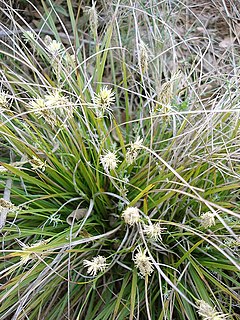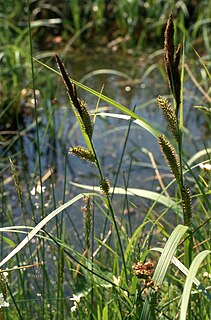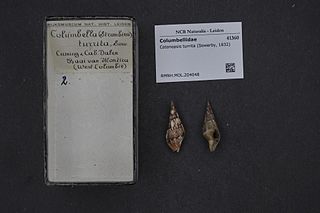
The Cyperaceae are a family of graminoid (grass-like), monocotyledonous flowering plants known as sedges. The family is large, with some 5,500 known species described in about 90 genera, the largest being the "true sedges" genus Carex with over 2,000 species.

Ornamental grasses are grasses grown as ornamental plants. Ornamental grasses are popular in many colder hardiness zones for their resilience to cold temperatures and aesthetic value throughout fall and winter seasons.

Carex is a vast genus of more than 2,000 species of grass-like plants in the family Cyperaceae, commonly known as sedges. Other members of the family Cyperaceae are also called sedges, however those of genus Carex may be called true sedges, and it is the most species-rich genus in the family. The study of Carex is known as caricology.

Carex flacca, with common names blue sedge, gray carex, glaucous sedge, or carnation-grass,, is a species of sedge native to parts of Europe and North Africa. It is frequent in a range of habitats, including grasslands, moorlands, exposed and disturbed soil, and the upper edges of salt marshes. It has naturalized in eastern North America.
Yanal Bog is a 1.6 hectare biological Site of Special Scientific Interest on the southern edge of the North Somerset Levels, just north of the village of Sandford, North Somerset. It was notified as an SSSI in 1988.

Italia turrita is the national personification or allegory of Italy, in the appearance of a young woman with her head surrounded by a mural crown completed by towers. It is often accompanied by the Stella d'Italia, from which the so-called Italia turrita e stellata, and by other additional attributes, the most common of which is the cornucopia. The allegorical representation with the towers, which draws its origins from ancient Rome, is typical of Italian civic heraldry, so much so that the wall crown is also the symbol of the cities of Italy.
Belaturricula turrita is a species of sea snail, a marine gastropod mollusk in the family Borsoniidae.
Belaturricula is a genus of sea snails, marine gastropod mollusks in the family Borsoniidae.
Lissotesta turrita is a species of sea snail, a marine gastropod mollusk, unassigned in the superfamily Seguenzioidea.

Carex riparia, the greater pond sedge, is a species of sedge found across Europe and Asia. It grows in a variety of wet habitats, and can be a dominant species in some swamps. It is Britain's largest Carex, growing up to 130 cm tall, with glaucous leaves up to 160 cm long. It hybridises with a number of other Carex species, including the closely related Carex acutiformis – the lesser pond sedge. A variegated cultivar is grown as an ornamental grass.

Carex hirta, the hairy sedge or hammer sedge, is a species of sedge native across Europe. It has characteristic hairy leaves and inflorescences, and is the type species of the genus Carex.

Carex binervis, the green-ribbed sedge, is a European species of sedge with an Atlantic distribution. It is found from Fennoscandia to the Iberian Peninsula, and occurs in heaths, moorland and other damp, acidic environments. It typically grows to a height of 15–120 cm (6–50 in), and has inflorescences comprising one male and several female spikes, each up to 45 mm (1.8 in) long. The utricles have two conspicuous green veins, which give rise to both the scientific name and the common name of the species. In the vegetative state, it closely resembles C. bigelowii, a species that usually grows at higher altitude. C. binervis was first described by James Edward Smith in 1800, and is classified in Carex sect. Spirostachyae; several hybrids with other Carex species are known.

Carex sect. Ovales is a section of the genus Carex, containing around 85 species of sedge. It is the most diverse section of the genus in North America, containing 72 species:

Carex subg. Carex is a subgenus of the sedge genus Carex. It is the largest of the four traditionally recognised subgenera, containing around 1400 of the 2000 species in the genus. Its members are characterised by the presence of one or more exclusively male (staminate) terminal spikes, quite dissimilar in appearance from the lateral female (pistillate) spikes below. In most species, the female flowers have three stigmas, but a few species, including Carex nigra, have female flowers with only two stigmas.

Carex subg. Vignea is a subgenus of the sedge genus Carex, containing around 300 of the 2000 species in the genus. Its members are characterised by having bisexual, sessile spikes, where the female flowers have two stigmas each.

Cotonopsis turrita is a species of sea snails in the family Columbellidae. It is found in West America.

Vittina turrita is a species of aquatic snail, a gastropod mollusk in the family Neritidae.

Pseudoturritis turrita is a species of plant belonging to the family Brassicaceae.












